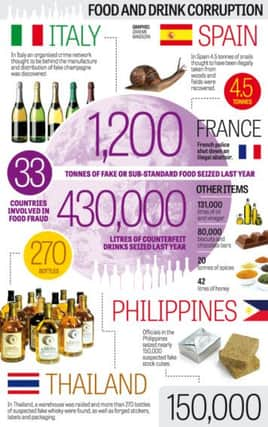Investigation: How cartels and organised crime gangs target food fraud riches


Experts say the global nature of the food chain offers the opportunity for criminals to sell counterfeit goods and unregulated food and drink to unsuspecting suppliers and customers in an industry where the trade in contraband can bring huge financial rewards.
Mixing cheaper rice with more expensive basmati, substituting cheaper cooking oils for pricier olive oil or switching cod for less expensive white fish can all bring rich pickings.
Advertisement
Hide AdAdvertisement
Hide AdIn 2014 more than 1,200 tonnes of fake or substandard food and nearly 430,000 litres of counterfeit drinks were seized in an Interpol and Europol coordinated operation across thirty three countries in the Americas, Asia and Europe. In Italy they uncovered what was believed to be an organised crime network involved in the manufacture and distribution of fake champagne and 4.5 tones of snails thought to have been illegally taken from fields and woods in Spain were recovered.
Last year a report by professor Chris Elliott, commissioned in the wake of the horsemeat scandal, recommended the setting up of a food crime unit with police-type powers. The report was commissioned in response to the horsemeat scandal that began to unfold in January 2013, when it emerged frozen burgers supplied to several supermarkets contained horse DNA. Other products were later found to have been affected.
Julian Sturdy, York Outer MP, said: “In today’s globalised food trade increasingly complex retail supply chains have made the accurate tracing of food more difficult than ever before.
“According to the Irish Department of Agriculture, the factory that supplied British supermarkets with 30 per cent horse burgers sourced its ingredients from more than forty different suppliers. In such a long and complicated supply chain the opportunity for fraud is sadly all too clear.”
Advertisement
Hide AdAdvertisement
Hide AdProfessor Elliott’s report highlighted research carried out in West Yorkshire which saw concerns raised over more than one third of food samples taken over a six month period with problems including beef containing pork or poultry or both. North Yorkshire Trading Standards found just two of 10 lamb curries bought from takeaways contained lamb.
Stuart Shotton, food integrity director at Foodchain Europe Limited, a food industry advisory service said yesterday there was evidence organised criminals and cartels were involved in food fraud.
“If you think about the penalties that you get for the smuggling of drugs it’s considerably less than if you supply drugs.”
He said it was possible for criminals to find a way of adulterating most products by substituting them or by lacing them with cheaper products to push up returns or by creating fake goods. “People tend to just look at the meat products but there’s the ability to essentially replace anything with anything else if you are clever and know where the risks are,” Mr Shotton added.
Advertisement
Hide AdAdvertisement
Hide Ad“There’s the potential for any type of scandal its just a case of being able to put your control measures in place. But from a UK point of view I think that we are in a good place.
“Things have got an awful lot better and an awful lot stronger and I would hope that consumers from a trust point of view are starting to regain the trust.”
Using the Freedom of Information Act the Yorkshire Post has secured information from councils about the type of food fraud cases investigated between 2011 and 2014. In Bradford two cases of the sale of food which was “unfit and potentially harmful” have been investigated, in Craven there has been one case of meat either stolen or illegally slaughtered while in Sheffield there have been a number of cases of the misdescription of alcohol with 24 such cases in 2013/2014 alone.
Some authorities, including Leeds and Harrogate, said they did not hold details locally and others, including Scarborough said there had been no cases. Others, including Kirkless reported a number of investigations related to the sale of unfit food but said they did not log whether they were fraud or genuine mistakes.